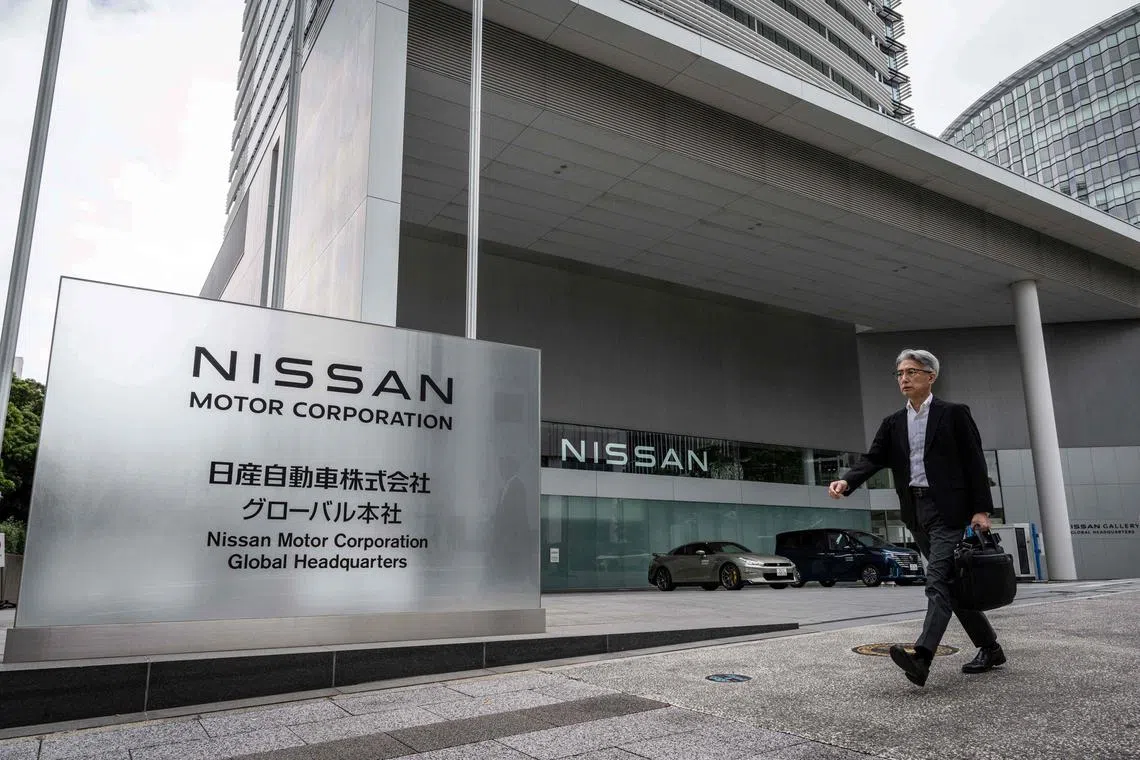Nissan slashes 9,000 jobs in restructuring, cuts CEO’s pay in half
Sign up now: Get ST's newsletters delivered to your inbox

The jobs cuts amount to about 7 per cent of Nissan’s workforce.
PHOTO: AFP
TOKYO – Nissan Motor’s struggle to cope with tougher car industry conditions and address weaknesses within its business has spiralled, leaving the automaker with no choice but to slash payroll, production and its forecasts for this fiscal year.
The Japanese company will dismiss 9,000 workers globally and reduce capacity by a fifth, among other cost-cutting measures, after net income plummeted 94 per cent in the first half. The job cuts amount to about 7 per cent of its workforce.
The carmaker will also will sell off some of its stake in Mitsubishi Motors after burning through 448.3 billion yen (S$3.89 billion) in cash during the last six months.
Nissan is now expecting to produce about 3.2 million vehicles in the year ending in March, almost 7 per cent fewer than the last fiscal year. The company also lowered its retail sales outlook to 3.4 million vehicles, paring forecasts for each of its major markets: North America, China, Japan and Europe.
The calamitous results will prove costly for chief executive Makoto Uchida, who is forfeiting half his compensation starting in November.
The CEO told investors that Nissan has been affected “not only by external challenges, but also by our specific issues”, alluding both to the breakneck rise of Chinese carmakers and Nissan setting overly ambitious sales targets.
“Meeting our sales goals will be a challenge,” Mr Uchida said. “We need to rebuild our strength so that we can pivot towards a more positive direction.”
Nissan now sees its operating income plunging to just 150 billion yen in the fiscal year ending in March, down 70 per cent from its previous forecast. Management also lowered its revenue outlook by more than 9 per cent, meaning it now expects virtually no growth for the year.
Mr Uchida has been at the helm since 2019, when Nissan was facing an existential crisis in the wake of former chairman Carlos Ghosn’s departure.
“Nissan is the weakest one,” said Mr James Hong, an analyst at Macquarie Securities Korea. “The only way for the company to improve sales is through price cuts.”
Nissan will sell almost a third of its shareholding in partner Mitsubishi Motors, paring its current stake of just over 34 per cent. The roughly 10 per cent holding that Nissan will offer up through the Tokyo Stock Exchange was worth about 68.6 billion yen at the close of trading on Nov 7.
Nissan is around eight months into a three-year turnaround plan meant to reinvigorate the business, though it was already backtracking earlier in 2024. In July, the company cut its annual operating profit outlook to 500 billion yen, from 600 billion yen, due to poor sales in China, Japan and North America.
Profit for the quarter that ended September was 32 billion yen, falling short of consensus estimates for 65 billion yen and further still from the 208 billion yen earned a year ago.
The plans Mr Uchida has laid out include expanding Nissan’s line-up of electric vehicles, forging new partnerships and selling an additional one million cars a year by 2027. But analysts have said the company’s new line-up lacks excitement and enough hybrid models – a problem when consumer demand for EVs is waning.
“The demand for hybrids is what’s allowing Toyota and Honda to enjoy strong profitability,” Macquarie’s Mr Hong said. “That strategy also needs to be revisited.”
Like many international legacy automakers, Nissan is struggling in China, the world’s biggest car market. In June, the company said it would cease production at a plant in Changzhou amid slumping sales.
In March, the company agreed with Honda Motor and Mitsubishi Motors to work together on the development of in-house software. This could pit the trio against Toyota Motor and its alliance with Subaru, Suzuki Motor and Mazda Motor. BLOOMBERG


